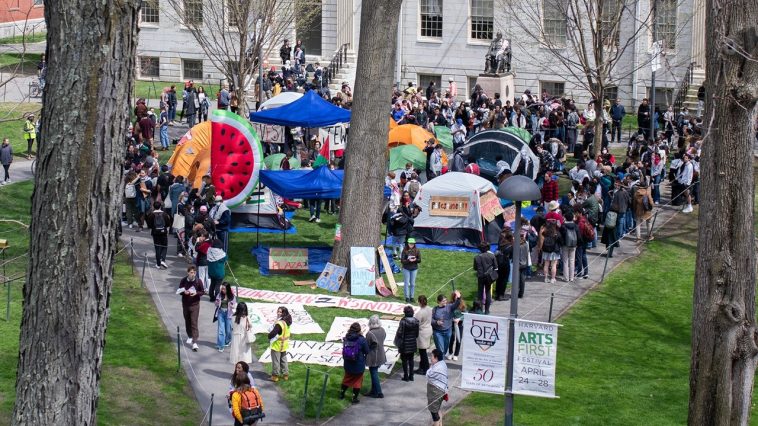On a recent Wednesday around midday, a substantial crowd of students convened outside University Hall at Harvard, voicing their discontent regarding the university’s recent decision to suspend the main pro-Palestinian student organization on campus, the Palestine Solidarity Committee. The students engaged in peaceful protest actions, including chants, marching, and rallying, and were seen carrying Palestinian flags and placards. The protest took place in Harvard Yard, an area that had been restricted by the university to students, faculty, and staff only this week. Access to the yard was strictly controlled, with only a few designated entrances and exits.
Almost an hour into the protest, some members of the crowd began to set up orange-colored tents within the precincts of the yard, typically a bustling area frequented by students, staff, alumni, visitors, and tourists alike. This progressive act of protest mirrored similar actions undertaken by student bodies in support of the Palestinian cause at other institutions like Emerson College, Tufts University, and MIT, which had also seen the construction of these camp-like structures persisting through Wednesday.
The movement, which the organizers addressed as a ‘liberated zone’, was primarily put together by an activist student organization known as the Harvard Out of Occupied Palestine Coalition. They expressed their purpose and mission through a publicly read out statement at the protest site, stating that they intended to put an end to Harvard’s alleged indirect participation in what they term as a ‘genocide of Palestinian people’, through moral and financial support.
In a statement posted on their Instagram and read out during the rally, the Coalition shared their demands. These included suppositions that Harvard disclose any existing financial ties to Israel and consequently divest from them, mirroring similar demands posed by protest organizers at MIT, Tufts, and Emerson College. They also implored the university to dismiss any disciplinary actions taken against students participating in such campus protests.
As the Wednesday protest rally concluded and students began to exit the yard, observations suggested a prevailing sense of high spirits among the protestors. Despite violating the yard’s regulation – as signposted outside, forbidding the setup of structures such as tents without prior authorization – the protestors continued with their plan to set up the tents.
Bystanders observed the unfolding scene through the enclosing gates of the yard. Alongside the vibrant student protests within, a monumental inflatable watermelon – adopted as a symbol of the pro-Palestinian movement – was prominently visible to onlookers from outside the gates.
In parallel to the restrictions placed on yard access, this week also saw Harvard’s decision to suspend the Palestine Solidarity Committee, a student group. Many students expressed no surprise at the suspension, noting the group’s recent controversial activities and citing wider anxieties around campus safety considering recent incidents at other educational institutions such as Columbia University.
There was a mixed reaction among students regarding the university’s suspension of the Palestine Solidarity Committee. Some viewed it as a muzzling of free speech whereas others acknowledged the delicate balance that institutions have to maintain between freedom of expression and the safety and security of the campus especially in light of recent events.
On that Tuesday, most entrances to the yard were marked with vividly noticeable red signs. This redirected people to the only five still active gates – all of which were manned by security personals checking for Harvard IDs. Certain students voiced their perception of an increased security presence relative to previous instances when the yard had been closed, such as during the inauguration of the university’s former president, Claudine Gay.
Despite the obvious increase in security measures, both graduate and undergraduate students reported a lack of official communication from the university explaining the yard’s closure or the rationale behind it. Nonetheless, many inferred that the decision was a likely response to the recent on-campus pro-Palestinian protests and subsequent arrests at universities such as Columbia University, Yale University, New York University, and MIT.
In response to queries about whether students were informed of the yard’s closure, Harvard remained silent. However, the university did issue a general public statement explaining that the restricted yard access using university ID cards was a proactive approach to avoid potential confrontations with unrecognized external groups.
The Harvard Crimson, the university’s daily student newspaper, published that an email was circulated among students and staff working in the yard. This indicated that the university had decided to close the yard out of an ‘abundance of caution’ prioritizing their community’s safety.
One first-year student, Jide Anekwe, expressed her dissatisfaction with both the university’s decision to close the yard and its suspension of the Palestine Solidarity Committee. ‘If the university wants to quell protests, they should try listening to what the protesters have to say or at the very least initiate a dialogue,’ she commented while outside the yard’s gates on Massachusetts Avenue.
Further, Anekwe voiced her belief that the university’s response to the recent upheaval in Gaza and the ensuing unrest on campus was lacking. She acknowledged that she did not expect the university to adopt any ‘radical stances’, but criticized its perceived lack of consideration for the viewpoints of students, particularly students of color.
While not holding high expectations of the university, Anekwe stated that her primary goal was simply to earn her degree and leave. Additionally, she mentioned that several students she spoke to appreciated the lesser crowd in the yard. ‘People are just relieved that they can now get to class on time without having to navigate through throngs of tourists,’ she remarked.
Her last comments underscored the fact that life continues despite the ongoing protests, reflecting a sense of normality amid campus unrest. As this continues to be a developing situation, more information and updates will follow.



